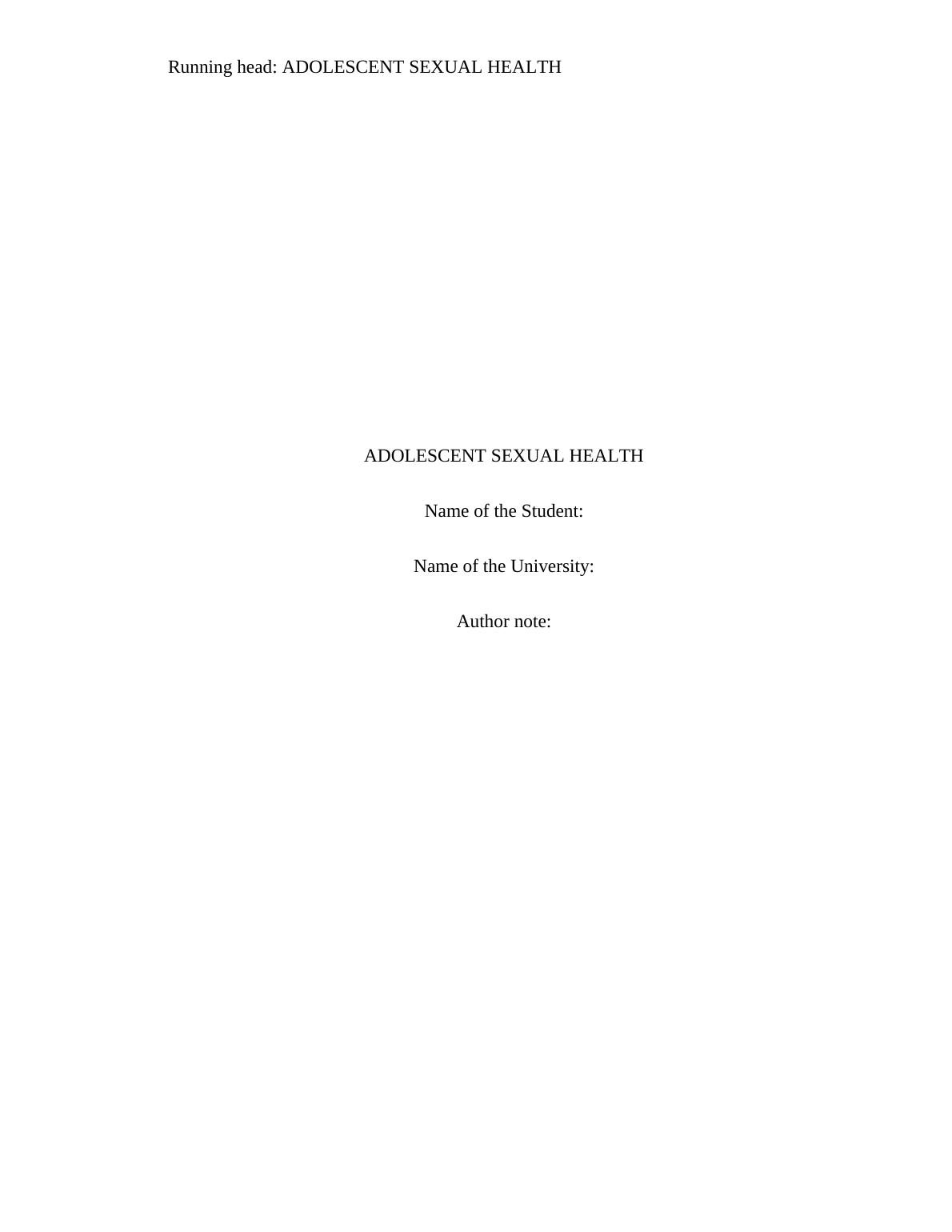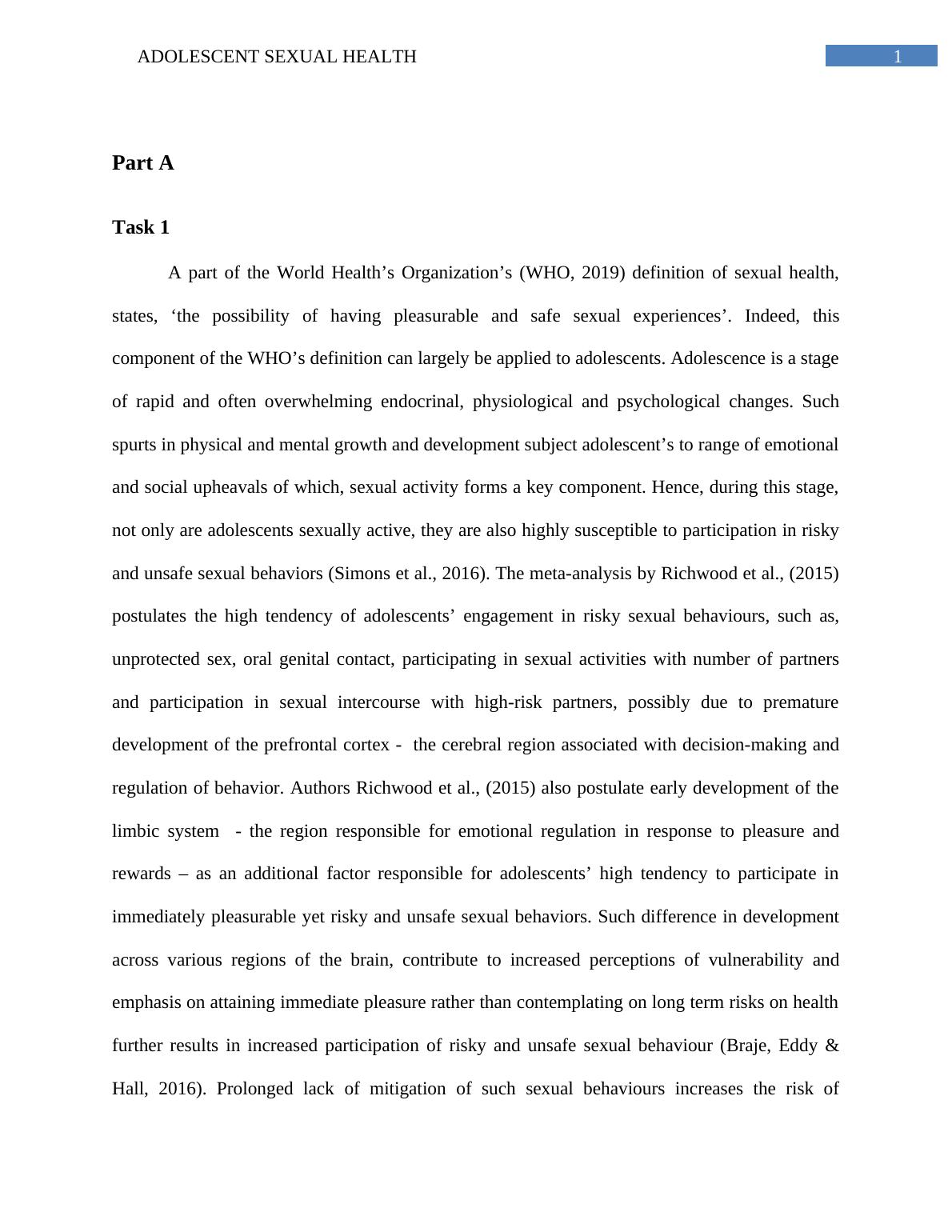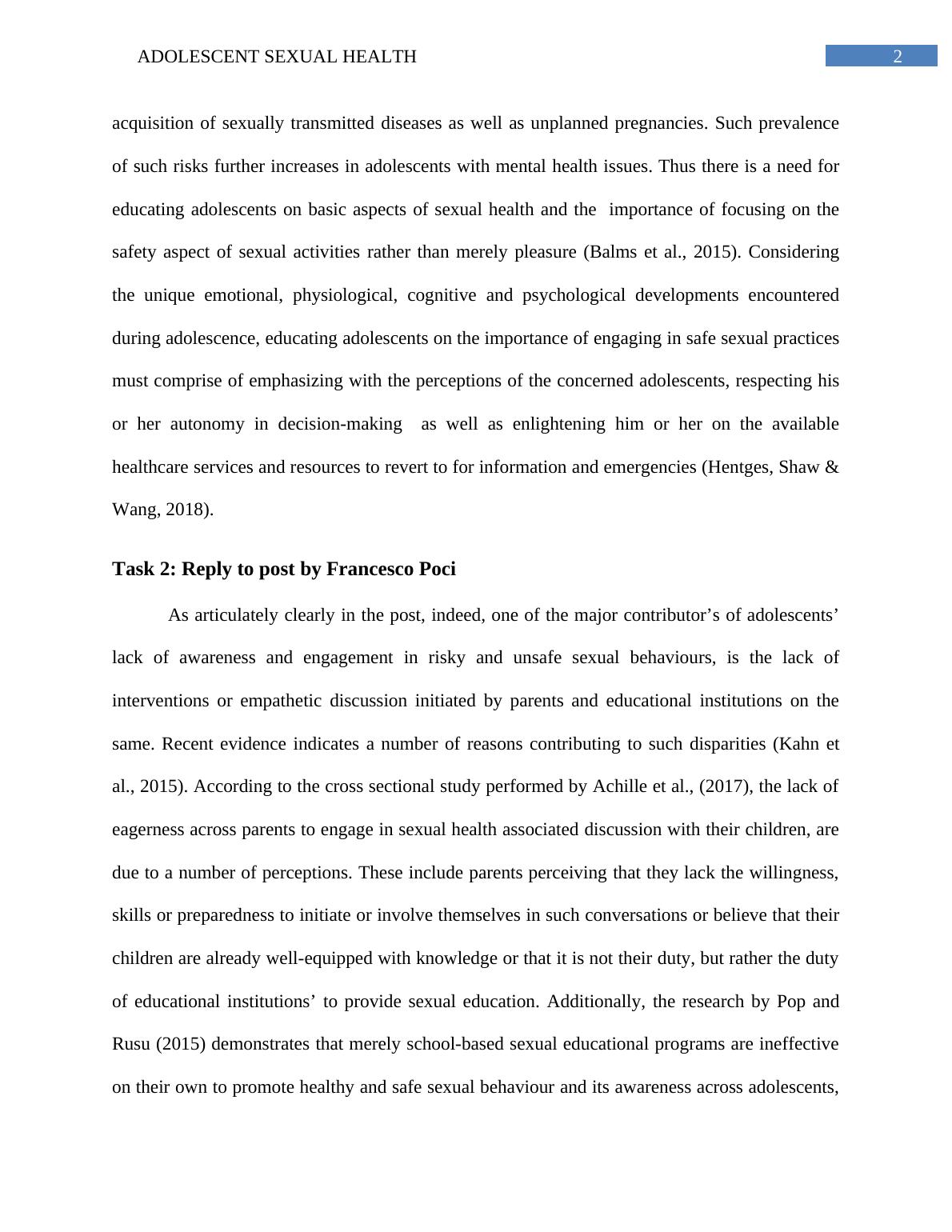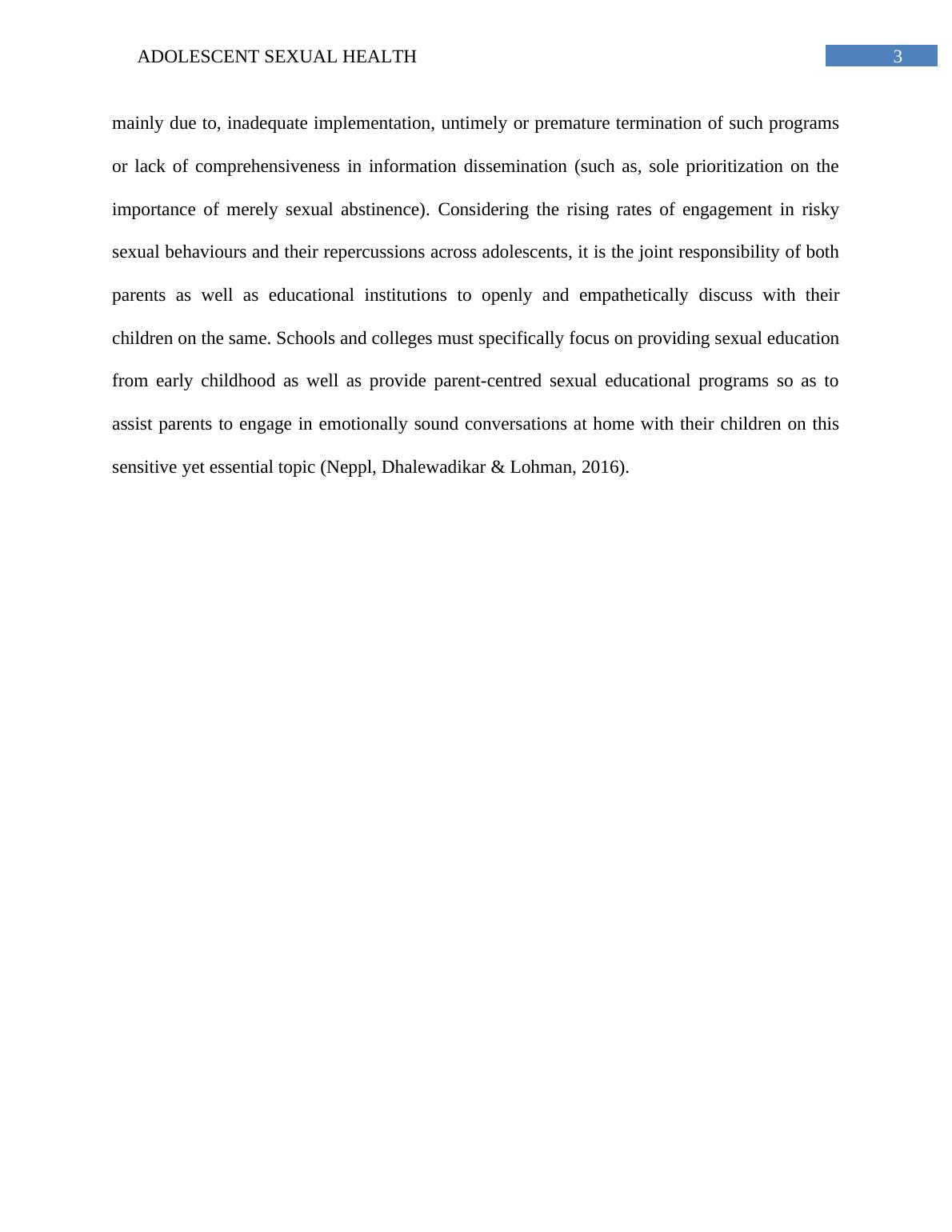Adolescence is a stage of rapid
Added on 2022-09-14
11 Pages2662 Words11 Views
Running head: ADOLESCENT SEXUAL HEALTH
ADOLESCENT SEXUAL HEALTH
Name of the Student:
Name of the University:
Author note:
ADOLESCENT SEXUAL HEALTH
Name of the Student:
Name of the University:
Author note:

1ADOLESCENT SEXUAL HEALTH
Part A
Task 1
A part of the World Health’s Organization’s (WHO, 2019) definition of sexual health,
states, ‘the possibility of having pleasurable and safe sexual experiences’. Indeed, this
component of the WHO’s definition can largely be applied to adolescents. Adolescence is a stage
of rapid and often overwhelming endocrinal, physiological and psychological changes. Such
spurts in physical and mental growth and development subject adolescent’s to range of emotional
and social upheavals of which, sexual activity forms a key component. Hence, during this stage,
not only are adolescents sexually active, they are also highly susceptible to participation in risky
and unsafe sexual behaviors (Simons et al., 2016). The meta-analysis by Richwood et al., (2015)
postulates the high tendency of adolescents’ engagement in risky sexual behaviours, such as,
unprotected sex, oral genital contact, participating in sexual activities with number of partners
and participation in sexual intercourse with high-risk partners, possibly due to premature
development of the prefrontal cortex - the cerebral region associated with decision-making and
regulation of behavior. Authors Richwood et al., (2015) also postulate early development of the
limbic system - the region responsible for emotional regulation in response to pleasure and
rewards – as an additional factor responsible for adolescents’ high tendency to participate in
immediately pleasurable yet risky and unsafe sexual behaviors. Such difference in development
across various regions of the brain, contribute to increased perceptions of vulnerability and
emphasis on attaining immediate pleasure rather than contemplating on long term risks on health
further results in increased participation of risky and unsafe sexual behaviour (Braje, Eddy &
Hall, 2016). Prolonged lack of mitigation of such sexual behaviours increases the risk of
Part A
Task 1
A part of the World Health’s Organization’s (WHO, 2019) definition of sexual health,
states, ‘the possibility of having pleasurable and safe sexual experiences’. Indeed, this
component of the WHO’s definition can largely be applied to adolescents. Adolescence is a stage
of rapid and often overwhelming endocrinal, physiological and psychological changes. Such
spurts in physical and mental growth and development subject adolescent’s to range of emotional
and social upheavals of which, sexual activity forms a key component. Hence, during this stage,
not only are adolescents sexually active, they are also highly susceptible to participation in risky
and unsafe sexual behaviors (Simons et al., 2016). The meta-analysis by Richwood et al., (2015)
postulates the high tendency of adolescents’ engagement in risky sexual behaviours, such as,
unprotected sex, oral genital contact, participating in sexual activities with number of partners
and participation in sexual intercourse with high-risk partners, possibly due to premature
development of the prefrontal cortex - the cerebral region associated with decision-making and
regulation of behavior. Authors Richwood et al., (2015) also postulate early development of the
limbic system - the region responsible for emotional regulation in response to pleasure and
rewards – as an additional factor responsible for adolescents’ high tendency to participate in
immediately pleasurable yet risky and unsafe sexual behaviors. Such difference in development
across various regions of the brain, contribute to increased perceptions of vulnerability and
emphasis on attaining immediate pleasure rather than contemplating on long term risks on health
further results in increased participation of risky and unsafe sexual behaviour (Braje, Eddy &
Hall, 2016). Prolonged lack of mitigation of such sexual behaviours increases the risk of

2ADOLESCENT SEXUAL HEALTH
acquisition of sexually transmitted diseases as well as unplanned pregnancies. Such prevalence
of such risks further increases in adolescents with mental health issues. Thus there is a need for
educating adolescents on basic aspects of sexual health and the importance of focusing on the
safety aspect of sexual activities rather than merely pleasure (Balms et al., 2015). Considering
the unique emotional, physiological, cognitive and psychological developments encountered
during adolescence, educating adolescents on the importance of engaging in safe sexual practices
must comprise of emphasizing with the perceptions of the concerned adolescents, respecting his
or her autonomy in decision-making as well as enlightening him or her on the available
healthcare services and resources to revert to for information and emergencies (Hentges, Shaw &
Wang, 2018).
Task 2: Reply to post by Francesco Poci
As articulately clearly in the post, indeed, one of the major contributor’s of adolescents’
lack of awareness and engagement in risky and unsafe sexual behaviours, is the lack of
interventions or empathetic discussion initiated by parents and educational institutions on the
same. Recent evidence indicates a number of reasons contributing to such disparities (Kahn et
al., 2015). According to the cross sectional study performed by Achille et al., (2017), the lack of
eagerness across parents to engage in sexual health associated discussion with their children, are
due to a number of perceptions. These include parents perceiving that they lack the willingness,
skills or preparedness to initiate or involve themselves in such conversations or believe that their
children are already well-equipped with knowledge or that it is not their duty, but rather the duty
of educational institutions’ to provide sexual education. Additionally, the research by Pop and
Rusu (2015) demonstrates that merely school-based sexual educational programs are ineffective
on their own to promote healthy and safe sexual behaviour and its awareness across adolescents,
acquisition of sexually transmitted diseases as well as unplanned pregnancies. Such prevalence
of such risks further increases in adolescents with mental health issues. Thus there is a need for
educating adolescents on basic aspects of sexual health and the importance of focusing on the
safety aspect of sexual activities rather than merely pleasure (Balms et al., 2015). Considering
the unique emotional, physiological, cognitive and psychological developments encountered
during adolescence, educating adolescents on the importance of engaging in safe sexual practices
must comprise of emphasizing with the perceptions of the concerned adolescents, respecting his
or her autonomy in decision-making as well as enlightening him or her on the available
healthcare services and resources to revert to for information and emergencies (Hentges, Shaw &
Wang, 2018).
Task 2: Reply to post by Francesco Poci
As articulately clearly in the post, indeed, one of the major contributor’s of adolescents’
lack of awareness and engagement in risky and unsafe sexual behaviours, is the lack of
interventions or empathetic discussion initiated by parents and educational institutions on the
same. Recent evidence indicates a number of reasons contributing to such disparities (Kahn et
al., 2015). According to the cross sectional study performed by Achille et al., (2017), the lack of
eagerness across parents to engage in sexual health associated discussion with their children, are
due to a number of perceptions. These include parents perceiving that they lack the willingness,
skills or preparedness to initiate or involve themselves in such conversations or believe that their
children are already well-equipped with knowledge or that it is not their duty, but rather the duty
of educational institutions’ to provide sexual education. Additionally, the research by Pop and
Rusu (2015) demonstrates that merely school-based sexual educational programs are ineffective
on their own to promote healthy and safe sexual behaviour and its awareness across adolescents,

3ADOLESCENT SEXUAL HEALTH
mainly due to, inadequate implementation, untimely or premature termination of such programs
or lack of comprehensiveness in information dissemination (such as, sole prioritization on the
importance of merely sexual abstinence). Considering the rising rates of engagement in risky
sexual behaviours and their repercussions across adolescents, it is the joint responsibility of both
parents as well as educational institutions to openly and empathetically discuss with their
children on the same. Schools and colleges must specifically focus on providing sexual education
from early childhood as well as provide parent-centred sexual educational programs so as to
assist parents to engage in emotionally sound conversations at home with their children on this
sensitive yet essential topic (Neppl, Dhalewadikar & Lohman, 2016).
mainly due to, inadequate implementation, untimely or premature termination of such programs
or lack of comprehensiveness in information dissemination (such as, sole prioritization on the
importance of merely sexual abstinence). Considering the rising rates of engagement in risky
sexual behaviours and their repercussions across adolescents, it is the joint responsibility of both
parents as well as educational institutions to openly and empathetically discuss with their
children on the same. Schools and colleges must specifically focus on providing sexual education
from early childhood as well as provide parent-centred sexual educational programs so as to
assist parents to engage in emotionally sound conversations at home with their children on this
sensitive yet essential topic (Neppl, Dhalewadikar & Lohman, 2016).

End of preview
Want to access all the pages? Upload your documents or become a member.
Related Documents
RESEARCH PROPOSAL ON TRAUMA IN ADOLESCENCElg...
|10
|2426
|22
Child Sexual Agression or Abuse: Immediate and Long-Term Impact on the Child and Their Familieslg...
|13
|3674
|118
Sexual health challenges PDFlg...
|29
|8470
|59
Mental Health and Substance Use among Sexual Minority College Athletes and HIV-Positive Adolescents in Tanzania: A Studylg...
|5
|1252
|331
Health Concerns and Issues for Sub-Saharan African Immigrantslg...
|7
|1843
|76
Improving Participation for Indigenous Communities in Health and Educationlg...
|7
|2011
|173